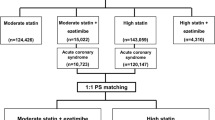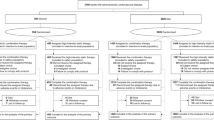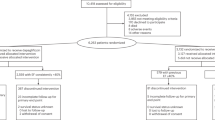Abstract
Statins may be beneficial for the prevention and treatment of heart failure, as indicated by large observational studies, small prospective studies, and post hoc analyses of cardiovascular databases. Two large, prospective, controlled trials have, however, shown that rosuvastatin has neutral effects on the survival of patients with chronic heart failure. The benefits of statin treatment seem to mostly result from their ability to halt disease progression in heart failure, particularly in patients with coronary artery disease. Based on these results, statin treatment might only be useful for the prevention of heart failure, and possibly in patients with new-onset heart failure. This Review highlights data from observational data analyses as well as from the large prospective trials investigating the safety and efficacy of statins in patients with heart failure. The results from these studies and their implications for the timing of initiating statin therapy in this patient population are also discussed.
Key Points
-
Statin therapy has been implicated in the prevention of adverse cardiovascular events, including new-onset heart failure
-
Several observational and post hoc analyses from large clinical trials have implied that statin therapy may provide benefit to patients with heart failure
-
Two large randomized, controlled trials demonstrated that rosuvastatin had neutral effects on long-term outcomes in patients with chronic systolic heart failure when added to standard neurohormonal antagonists
-
The discrepancy between observational data and randomized trials can be explained by study design, medications used, or patient selection criteria
-
Early enthusiasm for statins as a therapeutic strategy has been dampened following these trials
This is a preview of subscription content, access via your institution
Access options
Subscribe to this journal
Receive 12 print issues and online access
$209.00 per year
only $17.42 per issue
Buy this article
- Purchase on Springer Link
- Instant access to full article PDF
Prices may be subject to local taxes which are calculated during checkout

Similar content being viewed by others
References
Lipinski, M. J., Abbate, A., Fuster, V. & Vetrovec, G. W. Drug insight: statins for nonischemic heart failure—evidence and potential mechanisms. Nat. Clin. Pract. Cardiovasc. Med. 4, 196–205 (2007).
Ramasubbu, K., Estep, J., White, D. L., Deswal, A. & Mann, D. L. Experimental and clinical basis for the use of statins in patients with ischemic and nonischemic cardiomyopathy. J. Am. Coll. Cardiol. 51, 415–426 (2008).
Francis, S. E., Holden, H., Holt, C. M. & Duff, G. W. Interleukin-1 in myocardium and coronary arteries of patients with dilated cardiomyopathy. J. Mol. Cell. Cardiol. 30, 215–223 (1998).
Levine, B., Kalman, J., Mayer, L., Fillit, H. M. & Packer, M. Elevated circulating levels of tumor necrosis factor in severe chronic heart failure. N. Engl. J. Med. 323, 236–241 (1990).
Torre-Amione, G. et al. Proinflammatory cytokine levels in patients with depressed left ventricular ejection fraction: a report from the Studies of Left Ventricular Dysfunction (SOLVD). J. Am. Coll. Cardiol. 27, 1201–1206 (1996).
Chung, H. K. et al. Statin inhibits interferon-gamma-induced expression of intercellular adhesion molecule-1 (ICAM-1) in vascular endothelial and smooth muscle cells. Exp. Mol. Med. 34, 451–461 (2002).
Kwak, B., Mulhaupt, F., Myit, S. & Mach, F. Statins as a newly recognized type of immunomodulator. Nat. Med. 6, 1399–1402 (2000).
Mozaffarian, D., Nye, R. & Levy, W. C. Statin therapy is associated with lower mortality among patients with severe heart failure. Am. J. Cardiol. 93, 1124–1129 (2004).
Sola, S. et al. Statin therapy is associated with improved cardiovascular outcomes and levels of inflammatory markers in patients with heart failure. J. Card. Fail. 11, 607–612 (2005).
Tousoulis, D. et al. Effects of combined administration of low dose atorvastatin and vitamin E on inflammatory markers and endothelial function in patients with heart failure. Eur. J. Heart Fail. 7, 1126–1132 (2005).
Bleske, B. E. et al. Neutral effect on markers of heart failure, inflammation, endothelial activation and function, and vagal tone after high-dose HMG-CoA reductase inhibition in non-diabetic patients with non-ischemic cardiomyopathy and average low-density lipoprotein level. J. Am. Coll. Cardiol. 47, 338–341 (2006).
Krum, H. et al. Double-blind, randomized, placebo-controlled study of high-dose HMG CoA reductase inhibitor therapy on ventricular remodeling, pro-inflammatory cytokines and neurohormonal parameters in patients with chronic systolic heart failure. J. Card. Fail. 13, 1–7 (2007).
Hanada, T. & Yoshimura, A. Regulation of cytokine signaling and inflammation. Cytokine Growth Factor Rev. 13, 413–421 (2002).
Brown, J. H., Del Re, D. P. & Sussman, M. A. The Rac and Rho hall of fame: a decade of hypertrophic signaling hits. Circ. Res. 98, 730–742 (2006).
Drexler, H. et al. Endothelial function in congestive heart failure. Am. Heart J. 126, 761–764 (1993).
Diodati, J. G., Dakak, N., Gilligan, D. M. & Quyyumi, A. A. Effect of atherosclerosis on endothelium-dependent inhibition of platelet activation in humans. Circulation 98, 17–24 (1998).
Bates, K., Ruggeroli, C. E., Goldman, S. & Gaballa, M. A. Simvastatin restores endothelial NO-mediated vasorelaxation in large arteries after myocardial infarction. Am. J. Physiol. Heart Circ. Physiol. 283, H768–H775 (2002).
Trochu, J. N. et al. Preservation of NO production by statins in the treatment of heart failure. Cardiovasc. Res. 60, 250–258 (2003).
Walter, D. H. et al. Statin therapy accelerates reendothelialization: a novel effect involving mobilization and incorporation of bone marrow-derived endothelial progenitor cells. Circulation 105, 3017–3024 (2002).
Kjekshus, J., Pedersen, T. R., Olsson, A. G., Faergeman, O. & Pyörälä, K. The effects of simvastatin on the incidence of heart failure in patients with coronary heart disease. J. Card. Fail. 3, 249–254 (1997).
Horwich, T. B., Hamilton, M. A., Maclellan, W. R. & Fonarow, G. C. Low serum total cholesterol is associated with marked increase in mortality in advanced heart failure. J. Card. Fail. 8, 216–224 (2002).
Horwich, T. B., Hernandez, A. F., Dai, D., Yancy, C. W. & Fonarow, G. C. Cholesterol levels and in-hospital mortality in patients with acute decompensated heart failure. Am. Heart J. 156, 1170–1176 (2008).
Rauchhaus, M. et al. The relationship between cholesterol and survival in patients with chronic heart failure. J. Am. Coll. Cardiol. 42, 1933–1940 (2003).
von Haehling, S., Schefold, J. C., Springer, J. & Anker, S. D. The cholesterol paradox revisited: heart failure, systemic inflammation, and beyond. Heart Fail. Clin. 4, 141–151 (2008).
Emberson, J. R. et al. N-terminal Pro-B-type natriuretic peptide, vascular disease risk, and cholesterol reduction among 20,536 patients in the MRC/BHF heart protection study. J. Am. Coll. Cardiol. 49, 311–319 (2007).
Horwich, T. B., MacLellan, W. R. & Fonarow, G. C. Statin therapy is associated with improved survival in ischemic and non-ischemic heart failure. J. Am. Coll. Cardiol. 43, 642–648 (2004).
Ray, J. G., Gong, Y., Sykora, K. & Tu, J. V. Statin use and survival outcomes in elderly patients with heart failure. Arch. Intern. Med. 16 5, 62–67 (2005).
Anker, S. D. et al. Statin use and survival in patients with chronic heart failure—results from two observational studies with 5200 patients. Int. J. Cardiol. 112, 234–242 (2006).
Foody, J. M. et al. Statins and mortality among elderly patients hospitalized with heart failure. Circulation 113, 1086–1092 (2006).
Go, A. S., Lee, W. Y., Yang, J., Lo, J. C. & Gurwitz, J. H. Statin therapy and risks for death and hospitalization in chronic heart failure. JAMA 296, 2105–2111 (2006).
Krum, H. et al. Statins and symptomatic chronic systolic heart failure: a post-hoc analysis of 5010 patients enrolled in Val-HeFT. Int. J. Cardiol. 119, 48–53 (2007).
Krum, H. et al. Impact of statin therapy on clinical outcomes in chronic heart failure patients according to beta-blocker use: results of CIBIS II. Cardiology 108, 28–34 (2007).
Huan Loh, P. et al. The effects of initiation or continuation of statin therapy on cholesterol level and all-cause mortality after the diagnosis of left ventricular systolic dysfunction. Am. Heart J. 153, 537–544 (2007).
Ryan, R. P., McManus, R. J., Mant, J., Macleod, J. A. & Hobbs, F. D. Statins in heart failure: Retrospective cohort study using routine primary care data. Ann. Med. 41, 490–496 (2009).
Khush, K. K. et al. Effect of high-dose atorvastatin on hospitalizations for heart failure: subgroup analysis of the Treating to New Targets (TNT) study. Circulation 115, 576–583 (2007).
Ouzounian, M. et al. Statin therapy and clinical outcomes in heart failure: a propensity-matched analysis. J. Card. Fail. 15, 241–248 (2009).
Shah, R., Wang, Y. & Foody, J. M. Effect of statins, angiotensin-converting enzyme inhibitors, and beta blockers on survival in patients >or=65 years of age with heart failure and preserved left ventricular systolic function. Am. J. Cardiol. 101, 217–222 (2008).
Kjekshus, J. et al. Rosuvastatin in older patients with systolic heart failure. N. Engl. J. Med. 357, 2248–2261 (2007).
Tavazzi, L. et al. Effect of rosuvastatin in patients with chronic heart failure (the GISSI-HF trial): a randomised, double-blind, placebo-controlled trial. Lancet 372, 1231–1239 (2008).
Schachter, M. Chemical, pharmacokinetic and pharmacodynamic properties of statins: an update. Fundam. Clin. Pharmacol. 19, 117–125 (2005).
Rawlings, R. et al. Comparison of effects of rosuvastatin (10 mg) versus atorvastatin (40 mg) on rho kinase activity in caucasian men with a previous atherosclerotic event. Am. J. Cardiol. 103, 437–441 (2009).
Tsutamoto, T. et al. Effect of simvastatin vs. rosuvastatin on adiponectin and haemoglobin A1c levels in patients with non-ischaemic chronic heart failure. Eur. J. Heart Fail. 11, 1195–1201 (2009).
Fellström, B. C. et al. Rosuvastatin and cardiovascular events in patients undergoing hemodialysis. N. Engl. J. Med. 360, 1395–1407 (2009).
Ridker, P. M. et al. Rosuvastatin to prevent vascular events in men and women with elevated C-reactive protein. N. Engl. J. Med. 359, 2195–2207 (2008).
Cleland, J. G., Squire, I. & Ng, L. Interpretation of amino-terminal pro-brain natriuretic peptide levels in the HPS and the CORONA study. J. Am. Coll. Cardiol. 52, 1104–1105 (2008).
Cleland, J. G. et al. Plasma concentration of amino-terminal pro-brain natriuretic peptide in chronic heart failure: prediction of cardiovascular events and interaction with the effects of rosuvastatin: a report from CORONA (Controlled Rosuvastatin Multinational Trial in Heart Failure). J. Am. Coll. Cardiol. 54, 1850–1859 (2009).
McMurray, J. J. et al. Effects of statin therapy according to plasma high-sensitivity C-reactive protein concentration in the Controlled Rosuvastatin Multinational Trial in Heart Failure (CORONA): a retrospective analysis. Circulation 120, 2188–2196 (2009).
Folkeringa, R. J. et al. Statins associated with reduced mortality in patients admitted for congestive heart failure. J. Card. Fail. 12, 134–138 (2006).
Dickinson, M. G. et al. Statin use was associated with reduced mortality in both ischemic and nonischemic cardiomyopathy and in patients with implantable defibrillators: mortality data and mechanistic insights from the Sudden Cardiac Death in Heart Failure Trial (SCD-HeFT). Am. Heart J. 15 3, 573–578 (2007).
Author information
Authors and Affiliations
Corresponding author
Ethics declarations
Competing interests
W. H. Tang has worked as a consultant for Merck and received grant/research support from Abbott Laboratories. G. S. Francis has worked as a consultant for Merck.
Rights and permissions
About this article
Cite this article
Tang, W., Francis, G. Statin treatment for patients with heart failure. Nat Rev Cardiol 7, 249–255 (2010). https://doi.org/10.1038/nrcardio.2010.29
Published:
Issue Date:
DOI: https://doi.org/10.1038/nrcardio.2010.29
This article is cited by
-
Prevention of Heart Failure in Patients with Chronic Kidney Disease
Current Cardiovascular Risk Reports (2015)
-
Relationship between recommended chronic heart failure treatments and mortality over 8 years in real-world conditions: a pharmacoepidemiological study
European Journal of Clinical Pharmacology (2013)



